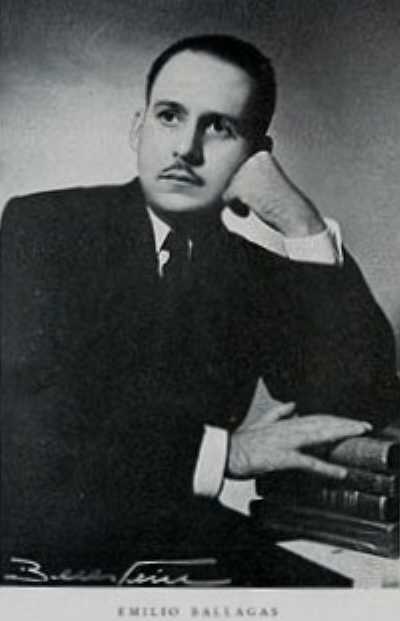4.1.1.17.3 The poetry collection “Sabor eterno”, from 1939, great elegies by Emilio Ballagas (1908 – 1954)

This collection of poems, while not considered by all scholars to be the poet’s most important, is certainly significant in terms of transcendent creative emotionality. Ballagas’s existential conflict reaches its climax here, expressed with supremely lyrical artistry. The combination of profound emotion and the aesthetic sophistication of the elegies is one of the most accomplished in our poetry, especially due to its profound experiential content.
The first edition of this collection also included verses from “Blancolvido,” which he later excluded. These were incorporated into the collection in his embrace of the innovative winds he embraced in his desire to expand the boundaries of poetry, to achieve a spiritual freedom only possible in verse, not yet “perverse” by a social morality that coerced its vital impulses.
However, Ballagas’ existential and poetic panorama becomes clouded – in this last sense for the benefit of his lyrics and Cuban poetry in general – in “Sabor eterno” (Eternal Flavor), the enjoyment gives way to a deep anguish before the impossibility of realizing on the carnal level his desires, his overwhelming passion that manifests itself in “Elegía sin nombre” (Nameless Elegy) and “Nocturno y elegía” (Nocturne and Elegy).
Religiosity constitutes a tone of the poem collection, the deep conflict derived from his passion of a proscribed sign emerges with neo-romantic tones through the expansion of an ego that can no longer bear the denial and needs to pour into a lyric of previously empty sounds all the emotional intensity of his encounter and his conflict.
However, the conflict between religiosity and homoerotic passion is resolved:
“I was going. You were coming,
even if your beautiful body were lying flat.
You moved forward, love, destiny pushed you,
as the titanic wind of men pushes the sails
shaken.
You were pushed by life, and the earth, and death
and hands that can do more than ourselves:
hands that can unite us and tear us apart
and rub our eyes with the juice of anemones…”
It is evident here that the poet has interpreted the appearance of the beloved as a sign of divinity, an envoy whose beauty satisfies Ballagas’s aesthetic ideal. In the earlier poems in the book, a fluctuating expectation is evident, evident in the verses of “Impatient Poem,” where the dialogue is evidently not with divinity but rather alludes to longings that can only be satisfied within the span of life, which death can cut short.
In this collection of poems, theological conflicts give way to the fears of not finding, not having, or losing the beloved. The feeling, the drive, has grown in intensity as the power of censorship increases, and it is significant that both elegies constitute pieces of extreme relevance to our poetry, superior in many ways to the vast majority of love poems with traditional heterosexual content.
Luis Alvarez considers the profound discovery of “Eternal Taste” to be: “Man perpetuates himself not in love, poetry, or memory, but in the essential whole of his journey through life, sharply outlined in the light of everyday existence, in which the only truly human attitude is to face pain with sober dignity. The teleological sense of man is this continuity, capable of transcending the self and projecting himself with decorum into the profound and mysterious whole of life.”








